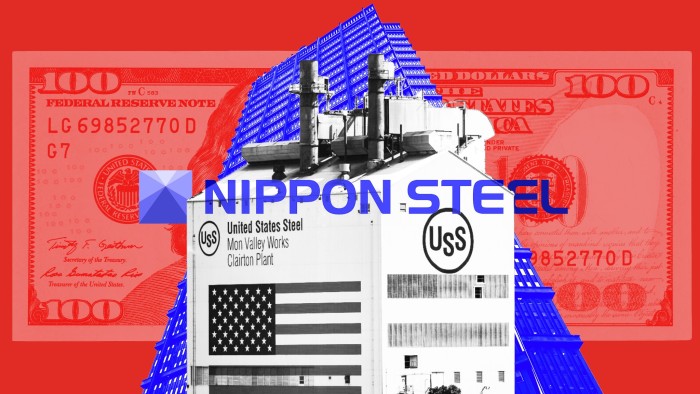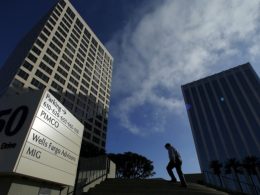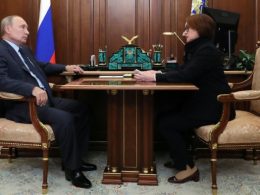This is the second of eight articles in the Investing in America 2024 special report that will be published on December 10
On a recent Sunday afternoon, an executive of Nippon Steel, the biggest steelmaker in Japan, settled into his seat at the Acrisure Stadium in Pittsburgh, Pennsylvania, to attend his first American football game.
As the song “Renegade” by the 1970s rock band Styx blasted over the speakers — a Pittsburgh Steelers home-game tradition — Takahiro Mori leapt up, beaming with tens of thousands of other fans, and whipped around the team’s iconic yellow “terrible towel” above his head.
Yet, unlike the other 67,000 in attendance, Mori was not just there to see whether the Steelers would beat the Baltimore Ravens. He was on a charm offensive to win support for the biggest deal of his career.
Just before Christmas 2023, Nippon agreed to buy an American icon: Pittsburgh-based US Steel. The $15bn transaction was initially seen as a corporate triumph, one that combined two companies central to the economies of close allies: the US and Japan.
Rahm Emanuel, the US ambassador to Japan and Barack Obama’s former chief of staff, took to social media platform X to laud the marriage: “These two iconic companies are defining the future of the key steel industry and forging a strong bond as they face a more competitive environment.”
But, just as quickly, the mood turned. At the beginning of this year, Republican presidential candidate Donald Trump said he would block the deal. Shortly after, President Joe Biden said US Steel should remain “domestically owned and operated”. His vice-president, Kamala Harris, agreed. This swift reaction was widely seen as pure politics: the company was headquartered in the most coveted swing state in the upcoming election (Emanuel wound up deleting his post).
The high-level, bipartisan opposition is also the strongest signal to date of how economic upheaval has pushed both US parties towards protectionism, reversing Washington’s once almost unquestioned support for globalisation and free trade. And the political backlash has sent a signal to other foreign investors: if you want to buy an American company, be ready for a fight.
“From the get-go, the question has been: is this a one-off, or is this really a broader pattern that we should be concerned about?” says Mireya Solís, the director for the Center of Asia Policy Studies at the Brookings Institution. “Everybody understands the politics of this, but the level of opposition has taken some companies and others in Japan aback.”
The resistance has been driven by the United Steelworkers, America’s largest industrial union, which has argued that Japanese ownership could lead to job losses. David Burritt, US Steel’s chief executive, has argued the opposite, warning in September that, without the deal, thousands of jobs could be “at risk”.

Selling US Steel in an election year was never part of the plan. In July 2023, Ohio-based rival Cleveland Cliffs approached with an unsolicited offer to buy the entire company for $35 per share, or about $7.3bn.
The offer was substantially higher than the price US Steel’s stock was trading at the time, but executives thought the company was still worth more. That forced US Steel to launch an auction just as the presidential campaign revved into high gear.
According to people involved in the process, US Steel’s advisers reached out to 54 potential bidders. The USW threw its weight behind Cleveland. In the end, there was only one other competitor willing to bid at the higher price: Nippon Steel. After rounds of offers and counter-offers, the Japanese company won with a submission of $55 per share.
FT Live event: Investing in America Summit

10 December 2024
Maintaining competitive advantage, driving new business growth
In-Person & Digital | Well& by Durst x One Five One, New York | #FTInvestinginAmerica
The Biden administration has denied its opposition is political, arguing that foreign ownership presented national security concerns. It has also cited the hallowed place US Steel holds in American business history. But policy experts believe the real reason was Biden’s unwillingness to antagonise organised labour.
In Tokyo, Japanese officials and business executives were blindsided by the opposition. They have expressed dismay that Washington would regard their acquisition as a security threat given the close ties between the two treaty allies.
While the deal is under review by the Committee on Foreign Investment in the US, the government panel led by the Treasury that vets overseas investments for security risks, the US president will make the final decision.
In September, the deal appeared to be close to death. Mori, Nippon’s vice chair who has largely spearheaded the agreement, flew to Washington to meet with Cfius, according to a person familiar with the trip. Around that time, the panel concluded the security risks could not be overcome — all but ensuring the transaction was doomed.

In a last-minute twist, however, Nippon was granted a 90-day extension before Cfius made a formal recommendation to Biden, according to one person briefed on the decision. That not only bought the company more time but, crucially, pushed the evaluation past the frenzied presidential election — a timetable executives had hoped for all along.
Although Biden has just two months left in office, most participants believe he will make a decision on the deal before leaving the White House. “Obviously, the business community is watching this closely,” said Solís.
Blocking the deal could have a chilling effect not only on investment from Japan, which consistently ranks first for foreign direct investment in the US, but on interest from other US allies, especially with a new president-elect advocating a protectionist economic policy that includes steep tariffs.
“The United States has long had an open investment policy, with successive presidents going back to World War II, telling the world that the US is open for business,” said John Murphy, who leads the US Chamber of Commerce’s policy on international trade and investment. “It would be damaging to the US economy to send a signal that these job-supporting investments from close allied nations represent a threat.”

One of the thorniest issues for Nippon centres on the history of US Steel, which was founded by Gilded Age industrialist Andrew Carnegie during America’s rise as a world economic power. It is a legendary name stitched into the very fabric of America’s cultural history. “Perhaps, if the company involved wasn’t named US Steel, the situation might be a little different politically,” Murphy says.
In an effort to counteract the impression of an American icon falling into foreign hands, both companies have spent significant resources over the past several months mounting what some involved have described as a “grassroots political campaign” to convince local officials and workers that the deal is in their best interest. The campaigns have pitted union leadership against management at both Nippon and US Steel. Tactics have at times appeared ugly, with the two sides accusing each other of spreading lies.
“This went from being a legal review to a political fight,” said one adviser involved in negotiating the transaction. “I’m not sure there’s been a more politicised deal.”

Nippon says the steelworkers have refused to engage in any real talks, while union leadership insists the deal is merely a ploy for the Japanese company to quash American steel production in order to bolster manufacturing back home. Nippon Steel denies that is the plan, saying it would not make sense from a business perspective.
Nippon has committed to investing an additional $2.7bn into facilities represented by the union if the deal closes. It has produced YouTube videos detailing the transaction’s benefits, from more jobs to plant upgrades.
Along with US Steel, Nippon has hosted more than 70 town halls across the country to address employees’ concerns. Mori has been ferried between Pennsylvania, Indiana, Arkansas and Minnesota to make the case that Nippon is not an existential threat.
USW president David McCall doubts those assurances. “They’ve made promises that there will be no lay-offs and no plant shutdowns,” he said in an interview. But he pointed out that Nippon had indicated those pledges could be affected by “a change in the market” or if current production “interferes with their business plan”.
Still, there are signs that Nippon’s charm offensive is working. Some union members have defected from McCall’s stance, instead backing the Japanese takeover. Four of them expressed their support on Fox News in October.
“We are for the sale,” said Andy Macey, a maintenance technician at US Steel, on the cable network. He suggested that rank-and-file members wanted union leadership to meet Nippon to discuss the terms. “That’s all we’re asking — just meet with them,” he added.
One sticking point for McCall is whether Nippon has plans to close down the company’s blast furnace facilities, which are more labour-intensive — and employ more people — than other types of production. The Japanese steelmaker has insisted it has no plans to shut them down, arguing instead that it has earmarked $300mn for investment in blast furnaces in Gary, Indiana, alone.
Regardless of the merits, however, many involved in the negotiations believe the ultimate decision — even now, after election season has ended — will be political. Several believe it could be a sign of things to come for foreign takeovers.
“There was [once] a lot more confidence in the rule of law, and that it would prevail,” said one adviser involved in the deal’s negotiations. “But what we’ve seen is the legal process being manipulated by political interests.”
Source link









